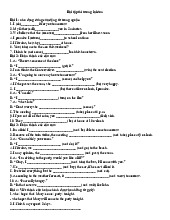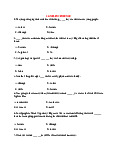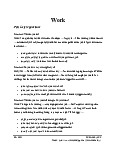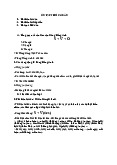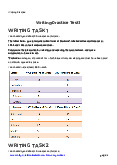


Preview text:
REVISION
PART 1: Interview/Social interaction
Answer questions about yourself. Be ready to provide information about: - Your personality -
Your hobby/hobbies/likes/dislikes - Your study - Your skills - Your social activities - Your future job PART 2: Dialogue Situation 1
Student A: You are a/an….(e.g. ice-cream taster). You want to change your career. Talk with
a job counselor about your job, tell him/her about your skills, characteristics and strengths, and
ask him to help you find the right job.
Student B: You are a job counselor and you talk with a/an …(e.g. ice-cream taster) about
his/her job. Ask him/her for as much information as possible about his/her job and then help
him/her to identify skills, characteristics and strengths and find another job that may be better for him/her. Situation 2
Student A: You are a student. You need some help managing your time and learning better
study habits. You ask the counselor for help.
Student B: You are a student counselor. You talk with a student about his/her study habits.
Ask him/her for as much information as possible about his/her job and then help him/her to
manage his/her time and learn better study habits. Situation 3
Student A: You are a student. You want to get more time to finish your assignment. Talk with
your lecturer about the assignment and ask him/her for time.
Student B: You are a lecturer. Your student talk with you about his/her assignment which is
due. He/she would like to get more time to finish his/her assignment. You disagree but want him/her to turn it in on time. Situation 4
Student A: You are a reporter. You want to interview people in the street about manners.
Student B: You are walking in the street when a reporter stops you to interview about
manners. Try to give him as much information as you can about good or bad manners. Situation 5
Student A: You are a counselor who works with people who are trying to develop healthier
eating habits. Ask student B some questions to find out about his/her eating habits. Then give him/her some advice.
Student B: You are tired a lot of the time. You are visiting a counselor because you want
advice on how to improve your eating habits so that you will have more energy and feel better.
Answer student A’s questions. Situation 6
Student A: You are a doctor. Ask your patient some questions to find out about his/her health
problem. Then give him/her some advice to prevent or treat the disease.
Student B: You have some health problem (e.g. stress/ headaches/diabetes/high blood
pressure/obesity/sleep deprivation/stomachache/bad appetite. You are visiting a doctor because
you want advice on how to improve your health problem. Answer the doctor’s questions. Situation 7
Student A: You are a reporter. You want to interview people in the street about their everyday heroes.
Student B: You are walking in the street when a reporter stops you to interview about your
everyday hero. Try to give him as much information as you can about the person you admire. Situation 8
Student A: You are a reporter. You want to interview people in the street about eating habits of Vietnamese people nowadays.
Student B: You are walking in the street when a reporter stops you to interview about eating
habits of Vietnamese people nowadays. Try to give him as much information as you can. PART 3: Discussion
1. What is most important to you when choosing a job?
2. What skills do you think are most important for students to learn so they can find a
job/start a career in the future?
3. What are some challenges you face as a student? (e.g. having trouble remembering
information for tests, managing time poorly)
4. Discuss your bad study habits and strategies for improving them.
5. Do you think it’s better for students to live at home with their families, or away from home?
6. What is the most important factor in student success?
7. Do you agree or disagree with this idea: “The general public doesn’t have good manners anymore”?
8. What are some things that you like to buy new/used or that you never buy used?
9. Discuss different ways for a college student to save money.
10. What are some problems caused by unhealthy eating habits?
11. Discuss problems in your community that you think need to be solved, such as
homelessness, hunger, not enough education/jobs, pollution.
12. What are some positive/negative effects of video games on our health?
13. What kind of volunteer work do you think your community needs the most?
14. Is our language going to change because of the internet?
15. Do you think learning English will threaten our native language?
16. Discuss the usual eating habits of Vietnamese people.
